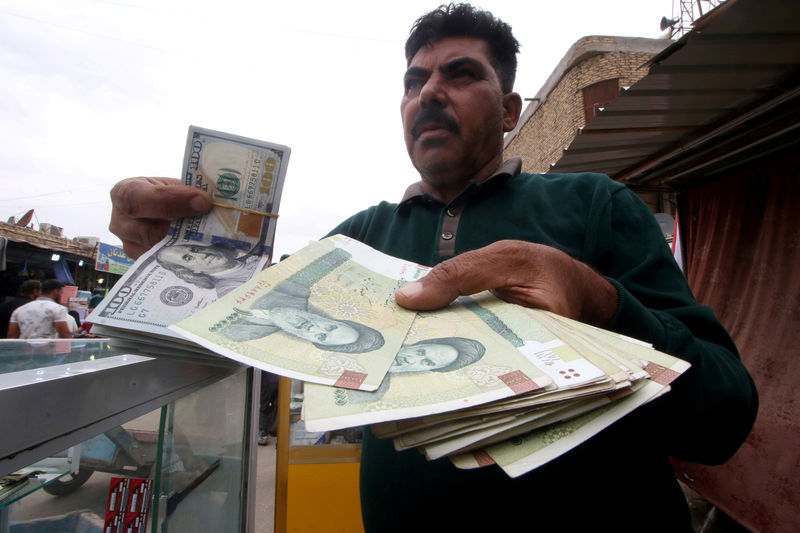By Andrew Torchia
(Reuters) - Iran is intervening in the foreign exchange market and threatening speculators to engineer a dramatic recovery of its rial currency, easing pressure on the oil-exporting economy as Tehran defies renewed U.S. sanctions.
The rial jumped to 105,500 against the U.S. dollar on Wednesday from 117,000 at the end of last week - and 152,500 at the end of October, according to foreign exchange website Bonbast.com (https://www.bonbast.com/).
The Financial Tribune and some other Iranian media reported on Tuesday that the rial had risen beyond 100,000 to the dollar. The foreign exchange market, however, has no single, official set of prices and traders often quote slightly different levels.
The rial's rebound, from record lows around 190,000 hit in late September, is good news for a government that is struggling to prevent U.S. sanctions on Iran's oil, banking and other industries from pushing the economy deep into recession.
President Donald Trump reimposed U.S. sanctions on Iran earlier this year after pulling out of world powers' 2015 nuclear deal with Tehran. Washington has vowed "maximum pressure" on Iran's economy to force it to accept tougher limits on its nuclear and missile programmes. Iran has ruled this out.
Rial weakness earlier this year disrupted Iran's foreign trade and helped boost annual inflation fourfold to nearly 40 percent in November. The weak currency has been a complaint of sporadic street protests since late last year.
If the government can support the value of the rial in coming months, it may be able to bring down inflation, improving living standards, and reduce capital flight from Iran.
"Because of the stronger rial, initial fears among many about the sanctions have eased somewhat, and fewer people are trying to buy dollars," a Tehran-based economist told Reuters, declining to be named because of political sensitivities.
SUPPLYING MARKET WITH DOLLARS
Iranian businessmen and economists contacted by Reuters said Iran's central bank was now supplying large amounts of dollars to the market - not only inside Iran but in foreign locations where the currency is traded, particularly Iraq and Dubai.
At the end of last week, state news agency IRNA quoted central bank governor Abdolnaser Hemmati as saying the bank would do everything in its power to obey an order from Supreme Leader Ayatollah Ali Khamenei to strengthen the rial.
Meanwhile, two men charged with economic crimes were executed last month, including Vahid Mazloumin, dubbed the “sultan of coins” by local media. He was accused of manipulating the currency market, according to Mizan, the news site of the Iranian judiciary. Thirty men were jailed this month for up to 20 years for economic crimes, the judiciary said.
Iranian economists said the campaign against economic crimes, combined with Khamenei's order to strengthen the rial, had made many traders more wary of bidding the currency lower.
Mehrdad Emadi, an Iranian economist who heads energy risk analysis at London's Betamatrix consultancy, said Tehran had deliberately allowed at least part of the rial's depreciation to occur earlier this year in order to meet its financial needs.
Authorities were able to sell dollars earned from oil exports at ultra-expensive rial rates near 190,000, raising cash to recapitalize state-linked banks and pension funds, he said. Now that the exercise has been completed, they are moving the rial back to levels they consider more comfortable, he added.
Nevertheless, the rial remains 59 percent below its value of 42,890 at the end of last year, and Emadi said the currency could come under fresh pressure to fall in 2019, depending on the impact of the sanctions and oil price levels.
In March, the International Monetary Fund estimated Iran was running a current account surplus and had over $100 billion of gross official reserves. Those numbers suggested Tehran might have enough reserves to defend the rial comfortably.
However, the IMF also said Tehran was having difficulty accessing some of its reserves as its relations with foreign banks were constrained by the threat of sanctions. Meanwhile, sanctions could cut the current account surplus sharply.
